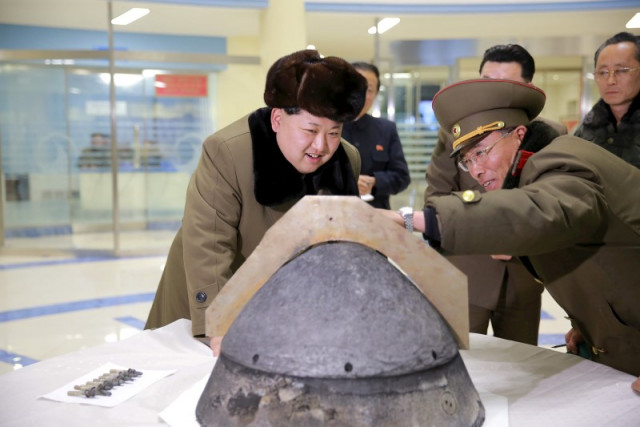Getting North Korea to give up nuclear bomb probably 'lost cause': US spy chief
Obama has repeatedly stated that the United States will never accept North Korean as a nuclear-armed state

North Korean leader Kim Jong Un looks at a rocket warhead tip after a simulated test of atmospheric re-entry of a ballistic missile, at an unidentified location in this undated file photo released by North Korea's Korean Central News Agency (KCNA) in Pyongyang on March 15, 2016. PHOTO: REUTERS
However, underscoring conflicting views in the Obama administration, the State Department said US policy was unchanged and continued to be to seek the "verifiable denuclearisation" of the Korean peninsula.
Satellite images show activity at North Korea nuclear test site: report
President Barack Obama has repeatedly stated that the United States will never accept North Korean as a nuclear-armed state.
Clapper made clear at an event at the Council on Foreign Relations think tank in New York he did not think that the policy the administration has stuck to, in spite of repeated North Korean nuclear tests, was realistic.
"I think the notion of getting the North Koreans to denuclearize is probably a lost cause," Clapper said at the Council on Foreign Relations think tank in New York. "They are not going to do that - that is their ticket to survival."
Pyongyang has persisted with its missile and nuclear weapons programs, including a Sept. 9 nuclear explosion, despite strong international sanctions.
Clapper said he got a good taste of how the world looks from North Korea's viewpoint when he went to Pyongyang on a mission in 2014 to secure the release of two Americans.
"They are under siege and they are very paranoid, so the notion of giving up their nuclear capability, whatever it is, is a non-starter with them," he said.
UN Security Council condemns North Korea failed missile launch
"The best we could probably hope for is some sort of a cap, but they are not going to do that just because we ask them. There's going to have to be some significant inducements."
China presses need to talk
US State Department spokesman John Kirby said he had not seen Clapper's remarks but told a regular news briefing in Washington that the administration did not believe denuclearisation was a lost cause.
"No, nothing's changed ... that's not our position. Our policy objective is to seek to obtain a verifiable denuclearisation of the Korean peninsula. That is the policy; that is both the goal and what we want to see and there is a way to do that."
Chinese Foreign Ministry spokesman Lu Kang, asked on Wednesday about Clapper's remarks, said the best way to resolve the North Korea nuclear issue was still via talks.
China and Russia have pushed for a resumption of six-party talks on denuclearisation in North Korea. The talks, which also involve Japan, South Korea and the United States, have been on hold since 2008.
Clapper also said it bothered him that the United States was not capitalizing on using information as a weapon against North Korea.
"That's something they worry about a lot ... That is a great vulnerability I don't think we have exploited. Right now, we are kind of stuck on our narrative and they are kind of stuck on theirs."
North Korea missiles flew 1,000km into Japan's air defence zone
Clapper was asked if he thought North Korea could mount a nuclear warhead on a missile that could reach the West Coast of the United States and reiterated the intelligence assessment that this had to be a "worst-case assumption."
He said North Korea had yet to test its KN08 intercontinental ballistic missile, so neither North Korea nor the United States knew whether it worked.
"Nevertheless, we ascribe to them the capability to launch a missile that would have a weapon on it to reach parts of the United States, certainly including Alaska and Hawaii," he said.
"They could do it. We have to make the worst-case assumption here."



















COMMENTS
Comments are moderated and generally will be posted if they are on-topic and not abusive.
For more information, please see our Comments FAQ